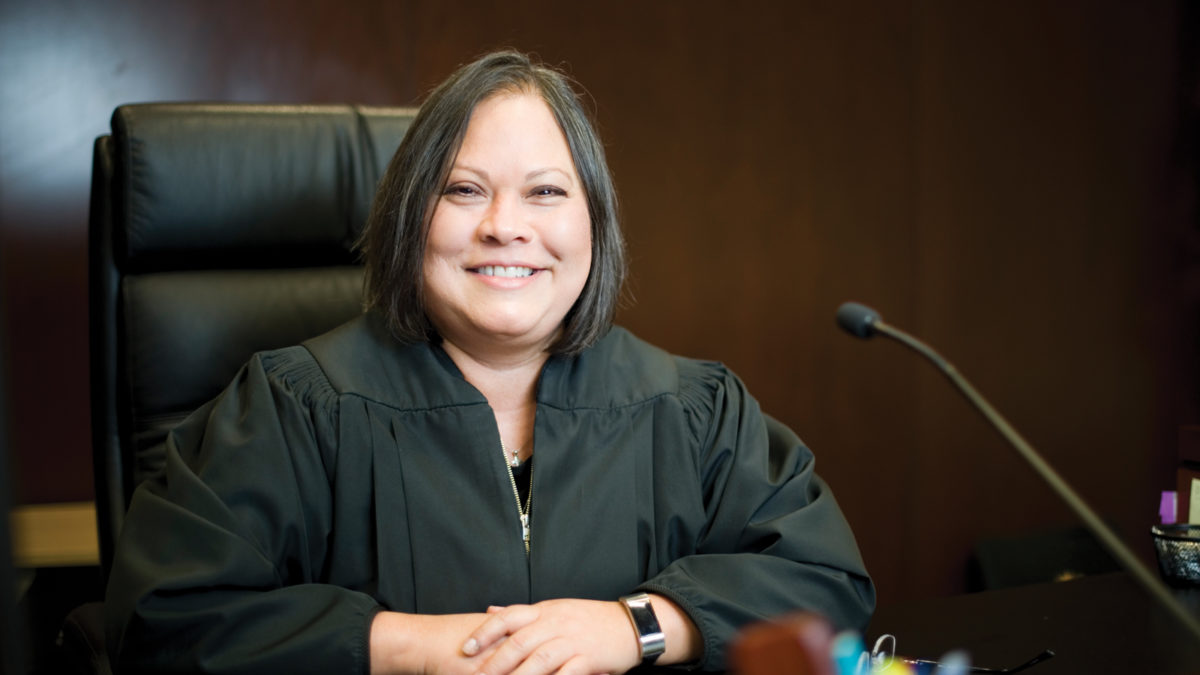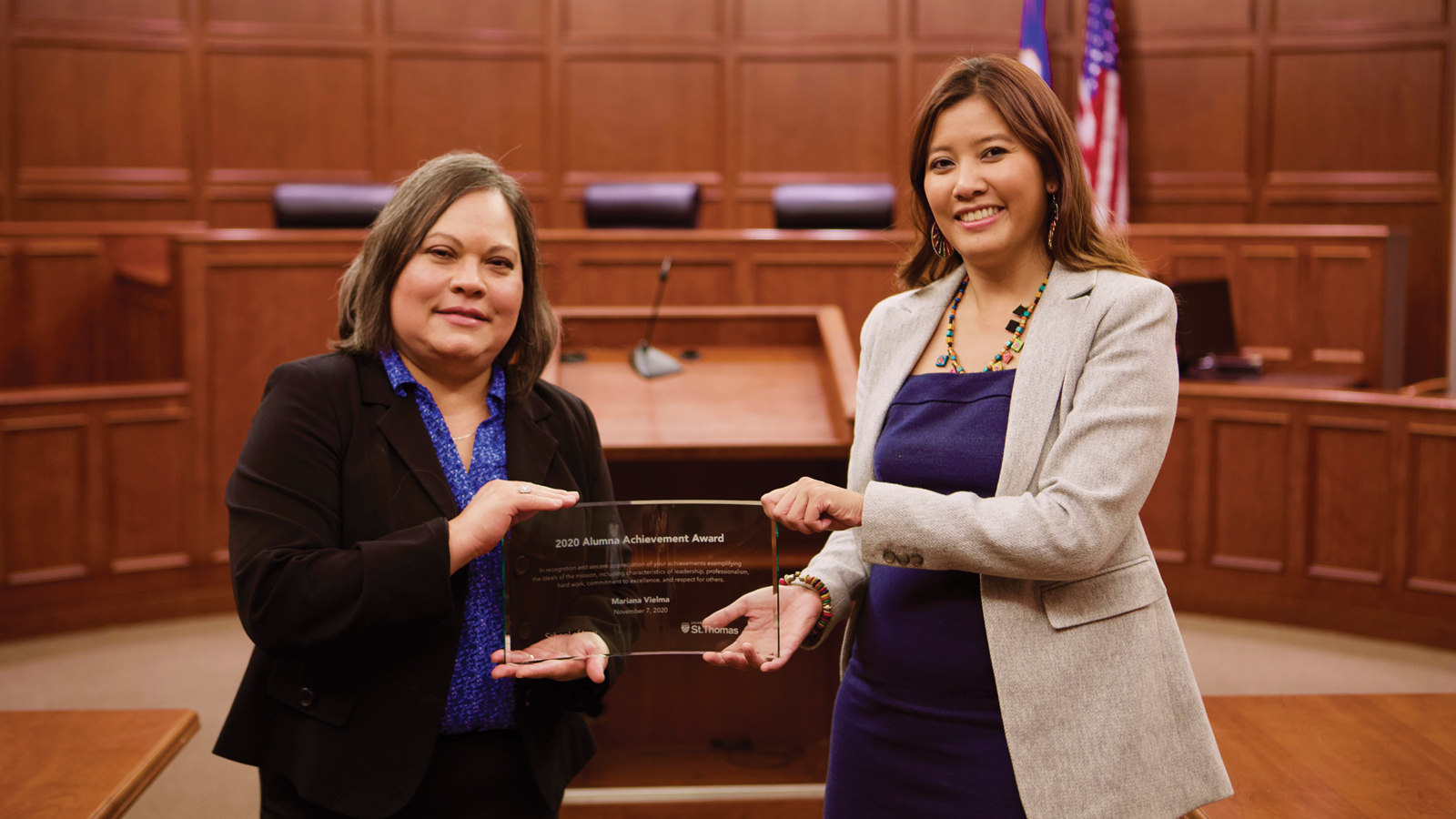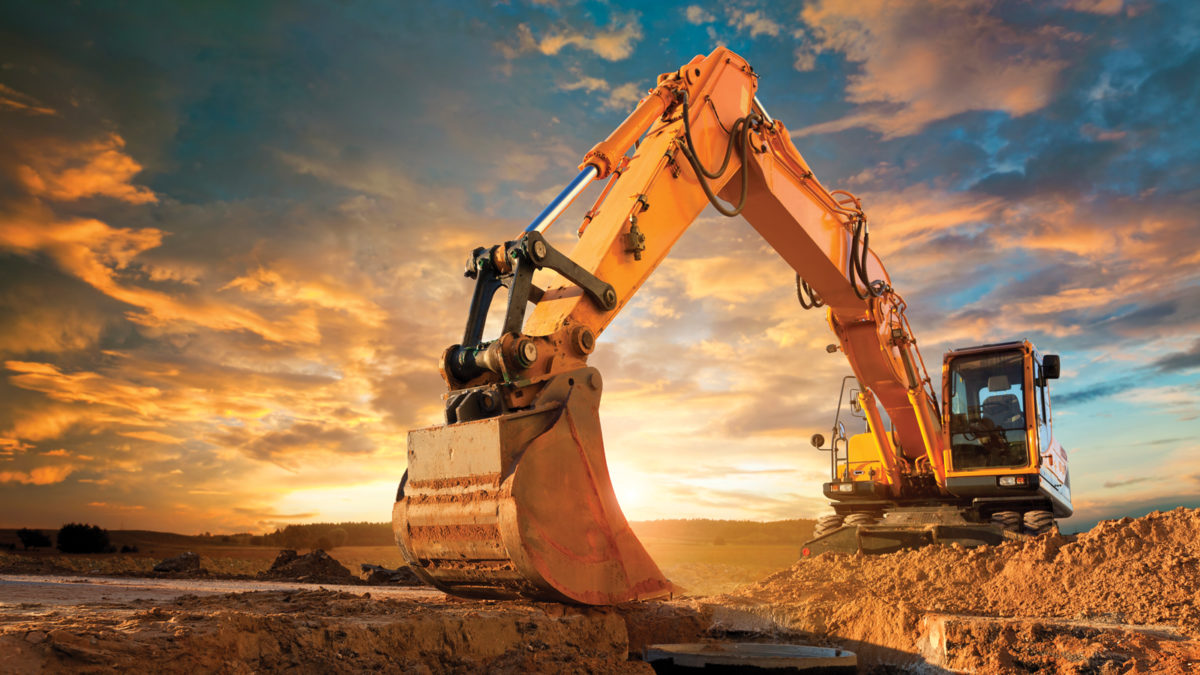
A Conversation with Judge Mariana Vielma
March 2021
Download This Article (.pdf)
This Q&A with Judge Mariana Vielma is part of a series of interviews with diverse lawyers conducted by the CBA/DBA Equity, Diversity, and Inclusivity (EDI) Joint Steering Committee. At the time of this interview, Judge Vielma was serving as a county court and district court magistrate in the 17th Judicial District. She has since been appointed to the Adams County Court bench. The EDI Committee is excited to highlight Judge Vielma and thankful she took the time to share her story with us.
Tell us about your family and where you grew up.
My father is an immigrant from Mexico and my mom comes from a family that, for many generations, lived in New Mexico. When you hear the term, “we were here, and then the border crossed us,” it refers to people who lived in Mexico, and then when the United States obtained that land, the people who already lived there became US citizens. This was the case with my mother’s family.
I am a Colorado native born in Denver, but I have lived in a lot of places in Colorado. We lived close to downtown Denver until I was almost 5, then we moved to Pierce, a small town in Weld County where my mom grew up. My parents divorced, and a few years later my mom remarried. My stepfather worked in the fields and on farms. My mom also worked in the fields in the summer, but otherwise, she was a stay-at-home mom and was there for us every day when we came home from school. We moved around to different places in Weld County and ended up in Larimer County for a couple of years, where my dad worked at another farm. We never lived in the same house or the same place more than a couple years, which was hard.
As a kid, the one thing I wanted was to go to college. I knew that was the only way to create options for my family. At the end of elementary school, I noticed we were working in the fields in the summer and other kids were doing things like going to camp, going on vacations, and playing sports or instruments. It was around that time I realized that, while I may not have had a lot of money, the classroom was an even playing field for everyone. I wanted to do well enough in school to get a scholarship to go to college and be a teacher. This would allow me to share with others a gift that nobody could ever take away: the gift of education. Doing well in school and going to college would be the way for me to help lift my family up and forward.
But when I was 16, my family moved to Mexico. I couldn’t bear the thought of not finishing high school, so I convinced my parents to let me stay in Pierce with an aunt and uncle. I finished my sophomore year and went to Mexico to be with my family for the summer, or so I thought. When my mom was sick that summer, I stayed to be with my family but never lost sight of my dream of going to college. After two years in Mexico, we moved back to Colorado. I decided the quickest way to college would be a GED, so I took the test and passed it one month before the rest of my high school class graduated.
My family is very tightly knit and has always been a source of strength and motivation for me. I wasn’t able to go to college right away. As the oldest of five children, I wanted to work and help my family. I wanted my brothers and sisters to have opportunities in school that I didn’t have. The next year, we moved to Idaho to work on potato farms. I worked a few years, first in a processing plant, then sorting potatoes in the fields and in a warehouse, eventually working my way to the warehouse secretary. One day the manager came to me and asked me to calculate a percentage for him. I thought, “Enough. This dude is getting paid to be the manager but needs me to do his math for him?! It’s time to go to college!”
I went to legal assistant school at the local vocational technical college—I wanted a job that would help move me forward, but also allow me to be able to afford to attend a four-year college. In my studies, I loved the legal classes. Having lived in another country, I had come to appreciate so many of the rights, privileges, and protections we enjoy in this country. I began to think that if, after all this time, I could find a way to afford to attend a university and earn a bachelor’s degree, then maybe I would go on to law school. It was such a big goal at that time. But I also knew that, in this country, even someone like me could find a way to achieve any dream or goal I set for myself as long as I was willing to work hard, make a few sacrifices, and help others along the way.
After earning an associate degree, I worked in Idaho for two years before moving to El Paso, Texas. My parents had moved back to Mexico for the winters, and I wanted to be in the US but still be close enough to Mexico in case I needed to be with my parents on short notice. After waiting one year to qualify for in-state tuition, I started at El Paso Community College and eventually transferred to the University of Texas at El Paso. I worked as a legal assistant and took as many classes as I could manage each semester. It took me seven years, but at age 33, I had finally realized my dream of having a degree.
As a legal assistant, I sometimes went to court. I started to see how people in the system were treated, sometimes with dignity and respect, and other times not so much. That’s when I knew I was going to go to law school—because PEOPLE should be treated like PEOPLE. I knew I could keep complaining about inequities in the legal system, or I could do something about it. So I decided to become the kind of lawyer who treats people with dignity and respect and would commit to improving the legal system, even if only in small ways, for the people I would encounter. Also, by this time I had several nieces and nephews. They had become an additional source of strength and motivation. I wanted to give them a living example of what I was telling them: you can be anything you want to be; you will have to work hard for it, but you can do it; always help and lift up others around you; don’t let others limit or define you.
Where did you go to law school?
I attended law school at the University of St. Thomas in Minneapolis. I went from El Paso, where it is crazy hot, to Minneapolis, where it is crazy cold! I remember sitting in the post office parking lot and reading through the information packet from St. Thomas, a Catholic law school dedicated to integrating faith and reason in the search for truth through a focus on morality and social justice. I had been studying and teaching some key themes of social justice as part of a high school youth program leadership team at my parish. St. Thomas had an immigration clinic. It was a brand-new law school, and I envisioned myself studying the law, practicing in the immigration clinic, and aligning with the school’s mission. I thought, “that’s me!”
Was law school the fit you had hoped it would be?
Absolutely! While studying the law I was able to think about how it translates into real life and its effects on all types of people across cultures and segments of society. I studied and worked three semesters in the law school immigration clinic. Advocating for immigrants kept me sane during the pressures of law school, reminding me of my values and goals.
What was your first job after law school, and what was your favorite part of that job?
My first job out of law school was as a law clerk in Adams County District Court, and I loved it! I was grateful to have a job! I was also so happy to be back in Colorado—I knew it was time. There had been so many places where I felt like I didn’t quite fit in. Most of my extended family was still in Colorado, and it is where I’ve felt the most at home. While growing up in Idaho and some places in Colorado, I would sometimes hear, “You’re not American, because you’re Mexican.” At the same time, people in Mexico said, “You’re not really Mexican, because you’re American.”
One of the best decisions I’ve made was coming back to Colorado. Beside one summer internship with the Public Defender’s Office, I didn’t really know any lawyers in Colorado. I had no idea how lucky I would be because we have an amazing legal profession in Colorado. We do so many things so well here! I loved the incredible exposure I received at the district court job to the legal system and procedures, seeing different types of cases, meeting judges and lawyers, working with staff, and interacting with the public.
What did you do between your first job and the bench?
I was a law clerk for two years, and then went to the Adams County District Attorney’s Office. I always thought I was going to be a public defender. I spent my first summer and second year of law school with Neighborhood Justice Center, a local nonprofit public defender organization in St. Paul, Minnesota. In my second summer I interned in the Greeley office of the Colorado State Public Defender. While a law clerk, I started to think again, “I can complain about how I think things should be on the other side, or I can do something about it and be the change I want to see.”
Judge Tom Ensor, the longest serving Colorado judge, convinced me to open my heart to a different path. He told me, “You all really want the same thing: justice. So why don’t you consider prosecution and seeking justice from that side and doing it in the way you think it should be done. You can do that.” I thought a lot about what that meant and opened my heart to changing my career path. Serving as a prosecutor turned out to be a great decision, and I felt like I was able to learn and accomplish so much. That job really set the stage for me continuing to evaluate my career path and gave me opportunities to get involved in the CBA, the Adams/Broomfield Bar Association, and local access to justice initiatives.
You are involved in a lot of things in the legal community! Why is that so important to you?
When I see a need, I often figure out how to address that need. I don’t need to be the leader. I find or help assemble the people working on addressing that need and collaborate in making the necessary changes. There are certain things that I believe are critically important, like access to justice, which I have been involved in since my early days as a DA. As lawyers, we have an obligation to find ways to ensure everyone in the community has equal access to the legal system. We talk about liberty and justice for all, but it has to be for everybody in the community. Because that value is so important to me, I have committed a lot of time and energy to it.
I also think leadership is important. Lawyers are called on to lead all the time, in the profession and in our communities. Sometimes we are thrown into leadership positions. If lawyers are not equipped to lead, it can be toxic for the organization. We are in a service profession—having lawyers who are equipped to lead is important not just to our own offices but to the people we serve. Through COBALT I saw the value and need to build diverse leadership pipelines in our profession. Again, because it is a value that is important, I’ve dedicated many years to COBALT and lifting up lawyers as leaders.
What are you doing now to help build a leadership pipeline?
We have talked a lot about diversity over the years but still have much work to do on the equity and inclusion aspects. It is time to stop talking and start doing, because actions speak louder than words. So I am now collaborating with the CBA/DBA Equity, Diversity, and Inclusivity Joint Steering Committee and the Colorado Women’s Bar Association on diversity, equity, and inclusion issues to help build those leadership pipelines within the organizations. I also want to coordinate those efforts with the Colorado Hispanic Bar Association. I continue to ask myself, how can I be an ally and help build leadership pipelines throughout the profession?
What made you want to be on the bench?
I’m not one of those people who has always wanted to be a judge. It’s hard! It can be isolating. If you really want to be effective and give people the attention they deserve, you really have to listen, focus, prepare, and meet people where they are. You can’t do other things when they are before you. When I left the DA’s office, I started thinking maybe I’d apply to be a judge someday—10 or 15 years in the future. From there I went to the Adams County Attorney’s Office. I worked on dependency and neglect cases, mental health hearings, child support, and other matters. I worked with a lot of people from a variety of cultures and economic and social statuses in our community. I started to hear about people who were afraid to come to the courthouse because they were immigrants, or simply felt unwelcome, unseen, or unheard. I thought, “it’s their courthouse, too. It belongs to everyone in our community.” There is an element of hospitality in being a judicial officer, who is the face of the judicial branch to the community she or he serves. So, I started to think, maybe I’ll do that when I retire from serving in my current job. But I also saw that our bench did not reflect the demographics of people that it served. Once again, I could complain about it, or I could do something about it.
There seems to be a theme here!
Yes! At the time, I worked with a fabulous, amazing team! But I thought, being a judicial officer is the only job for which I would leave the County Attorney’s Office. As a magistrate, I could broaden my impact on the Adams County community, and I could do it the way I thought it should be done, even the little things. For example, if a Spanish speaker appeared in my courtroom, I could greet them in Spanish. I wanted people to know that they would literally be heard, and the meaning of their words would not be lost in translation. Maybe some people do not think that’s a big deal, but I think it matters to most people.
What’s the best part of being on the Adams County bench?
Connecting with the Adams County community! Being in the courtroom with people in my community is the place where I finally feel like I fit in. After a lifetime of not quite fitting in, having to cross over cultures and segments of society, choosing a different path than generations of family before me, and all the struggles of the journey: all those pieces of my life come together in the courtroom when I can use my knowledge of the law to serve the community.
Moving forward, what do you hope to change, improve on, or influence in the legal system, or society, from the bench?
We have a lot of work to do together. It’s an interesting and challenging time in the world, with the COVID-19 pandemic and a lot of people crying out for equal justice for all. As a judicial officer, there are some things I cannot do, but I can listen to people with authentic empathy to ensure they are heard and seen. I can treat them with dignity and remind them that they matter and are more than the circumstances that bring them to court. I can also collaborate with other judicial officers, lawyers, and people in the community to find better ways to carry out our mission. And we must be willing to change and evolve. We have had to figure out how to do legal business remotely and must continue to do things better and more efficiently. I hope to continue to have conversations, even difficult ones, with others to find ways to do better throughout the system and profession.
What would you say to new professionals who are just graduating from law school, taking the bar, and getting their first jobs during a global pandemic?
Always remember why you went to law school and continue to self-check to remind yourself of what is really important. Know your values. There will always be someone to tell you what you can and cannot do, but you are the only person who can decide what you can and cannot do. Don’t let others define you. You don’t have to do it the way the profession says is the traditional way. You can find ways to build on what you have learned to get where you want to go. Open your mind and heart to different paths—sometimes you will follow a path you never imagined for yourself but one that may lead you to a place that feels like home. Don’t be set on one way. You can find your own way—don’t give up! Take the challenges along the way as opportunities to learn, grow, and think outside the box. Don’t be afraid to ask for help. We are truly all in this together.
Is there anything else you want to add?
Diversity matters, but so does inclusion and equity. Together, we need to ensure everyone has an opportunity for a seat at the table and to not just be seen but also heard and valued. When we value all the different perspectives that bring us together, we are all better.
I would not have had as many opportunities to do some of the things I have done in my career and in the legal profession if it were not for so many others. This includes recommendations and sponsorship from people with power in the profession, lawyers and judges who were willing to give me a leadership opportunity in the profession. That has made all the difference. If we want to make progress in diversity, equity, and inclusion, we must understand that folks with authority must step up to sponsor and promote those who might not otherwise have a seat and a voice at leadership tables. The kind of change we need won’t happen as quickly without this type of allyship.
While growing up in Idaho and some places in Colorado, I would sometimes hear, ‘‘You’re not American, because you’re Mexican.’’ At the same time, people in Mexico said, ‘‘You’re not really Mexican, because you’re American.’’



